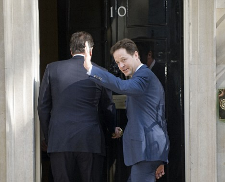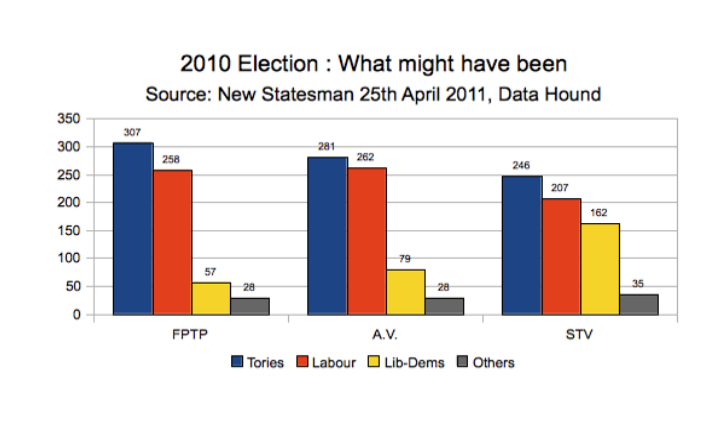 Martin Kettle, in an article at Comment is Free, on the Guardian’s web site, called “Vote yes to AV if you want to see Tories feel the fear again” among other arguments says something I have been struggling to say. I don’t know if he is Labour Party member of supporter, but I am and so I have quoted it here, and hope that fellow Labour supporters consider it before voting next week. I also suggest you read the article in full. I am unsure if his focus on Labour and anti-coalition activists helps make the argument that AV is fairer than FPTP, but for those who won’t, or don’t want to consider the issues on their merits, but only in the context of the current Government’s longevity and programme he has some interesting things to say which you should read in full. He concludes the article saying,
Martin Kettle, in an article at Comment is Free, on the Guardian’s web site, called “Vote yes to AV if you want to see Tories feel the fear again” among other arguments says something I have been struggling to say. I don’t know if he is Labour Party member of supporter, but I am and so I have quoted it here, and hope that fellow Labour supporters consider it before voting next week. I also suggest you read the article in full. I am unsure if his focus on Labour and anti-coalition activists helps make the argument that AV is fairer than FPTP, but for those who won’t, or don’t want to consider the issues on their merits, but only in the context of the current Government’s longevity and programme he has some interesting things to say which you should read in full. He concludes the article saying,
“Labour still thinks short-term and tactically, not long-term and strategically. It is obsessed with the wrong target, with battering the Lib Dems, with punishing Clegg for the coalition and the cuts, and using those votes to propel itself back into an overall majority. The first part of that may well happen, starting with the local and devolved elections. The second part, though, is much less certain. It depends on breaking the coalition quickly and winning an early election. But that isn’t going to happen, even if AV goes down.
If everyone in Labour thought straight they would see there is a powerful argument for saying that the coalition will be more weakened by a yes vote than a no. If you want to weaken the coalition you want the Lib Dems to be bolder in standing up for themselves against the Conservatives on a range of policy issues. That is more likely with the security of AV, which favours the Lib Dems because it is fairer, under their belt.
You also, however, want to weaken Cameron’s standing in his own party and strengthen the influence of the more rightwing Tories to create mayhem. A yes vote would be a lightning rod for these angry Tories. That’s why, if you want to harm the coalition, vote yes to AV. If you want to make the British establishment fear Labour again, vote yes.”
I understand how, in particular many Londoners, who will not have a chance to use their vote may wish to vote in the referendum to punish the coalition partners but this isn’t a vote of confidence in the Government. Voting No won’t save the NHS or stop further privatisation, or reverse the cuts.
Use your vote in the referendum to change our politics, vote “Yes”, that’s what I shall be doing. …
 On issues of tribalism I was unhappy to receive a No2AV leaflet, with a picture similar to the one on the left. I have tried to scan the original to share with you, but my scanner isn’t good enough. Interesting that they have Cameron’s back to us. Are they hoping that Labour and other left wingers will forget that the coalition is Tory led by the simple ruse of having him turn his back on us?. (It won’t be the last time!) The leaflet is decorated with text in UKIP’s Purple and Yellow. (Did they have some ink left over from the General Election?). The text suggests that we should oppose AV because of broken promises and back room deals, and that we, the voter, should punish the dishonest. It’s merely another attempt to keep the interests of the Tory party out of the debate. How stupid do they think we are? Why should we punish only Clegg and the Lib Dems for a deal they did with the Tories! Anyway, outside London we can punish them both in the local & national elections by voting against them.
On issues of tribalism I was unhappy to receive a No2AV leaflet, with a picture similar to the one on the left. I have tried to scan the original to share with you, but my scanner isn’t good enough. Interesting that they have Cameron’s back to us. Are they hoping that Labour and other left wingers will forget that the coalition is Tory led by the simple ruse of having him turn his back on us?. (It won’t be the last time!) The leaflet is decorated with text in UKIP’s Purple and Yellow. (Did they have some ink left over from the General Election?). The text suggests that we should oppose AV because of broken promises and back room deals, and that we, the voter, should punish the dishonest. It’s merely another attempt to keep the interests of the Tory party out of the debate. How stupid do they think we are? Why should we punish only Clegg and the Lib Dems for a deal they did with the Tories! Anyway, outside London we can punish them both in the local & national elections by voting against them. Martin Kettle, in an article at Comment is Free, on the Guardian’s web site, called
Martin Kettle, in an article at Comment is Free, on the Guardian’s web site, called 
 I shall be saying Yes2AV next week, if I can get to a polling station, as I shall be working. It’s not much of an excuse, but its the last day of the working week and I shall be commuting back to Hampshire, particularly if I want to vote in the local authority elections.
I shall be saying Yes2AV next week, if I can get to a polling station, as I shall be working. It’s not much of an excuse, but its the last day of the working week and I shall be commuting back to Hampshire, particularly if I want to vote in the local authority elections. So earlier today,
So earlier today,